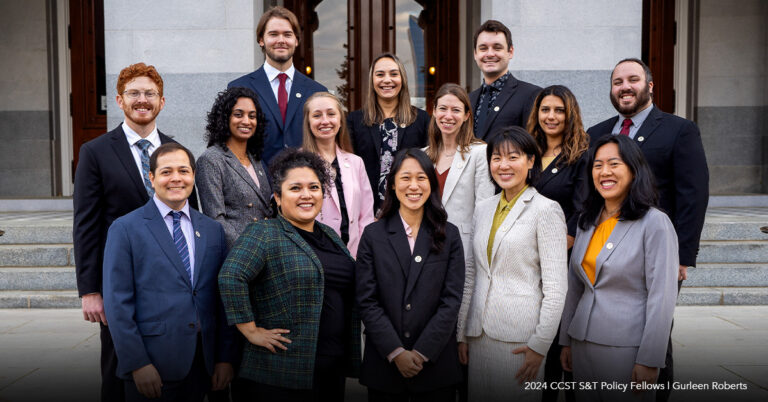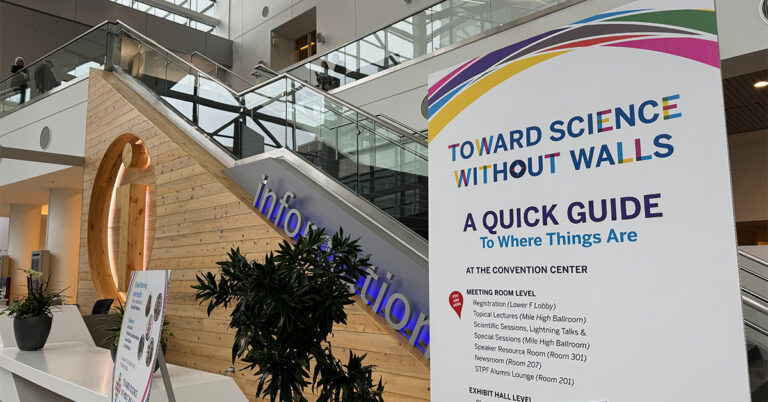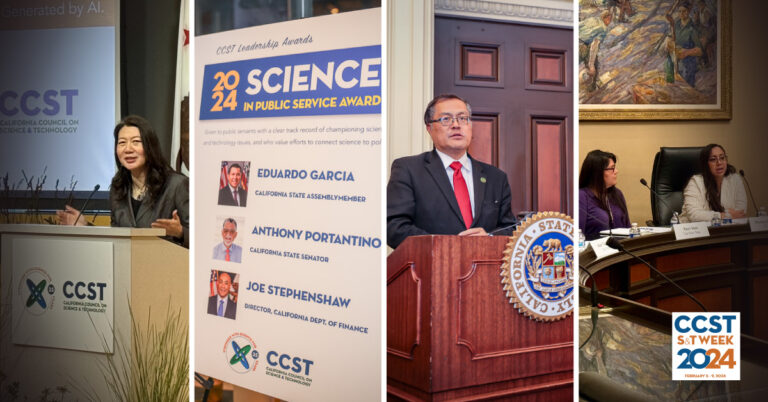Update: Applications for the CCST Science & Technology Policy Fellowship Have Closed
Science Magazine Editorial Makes Case for “Science for State Legislatures”
April 20, 2018 | CCST Newsroom
The CCST Science & Technology Policy Fellowship program is a strong and effective model for bringing sorely needed science and technology expertise to state legislatures around the country. Such was the driving message in an editorial published in the April 6th issue of Science magazine, penned by Mary Maxon PhD, Associate Laboratory Director for Biosciences at the Lawrence Berkeley National Laboratory, and Bruce Alberts PhD, the Chancellor’s Leadership Chair for Science and Education in the Department of Biochemistry and Biophysics at UCSF.
“The establishment of S&T fellowship programs in other states could greatly increase evidence-based policy-making and not only benefit state policy-makers but also help to inform national policy-making and society as a whole,” they wrote in their editorial.
Maxon and Alberts both serve on CCST’s Fellowship Advisory Committee, which steers the overall quality and implementation of the program. Alberts also currently serves on the CCST Board of Directors.
The Science editorial followed another commentary co-authored by Alberts and Maxon published in the Proceedings of the National Academy of Sciences, in which they presented insights and observations from CCST Science Fellow alumni — findings which lend evidence to the role that CCST Science Fellows are playing in providing helpful science advice to the policymaking process of the California State Legislature.
Maxon, who has been involved with the CCST Science Fellows program since its conception, expressed the hope that the idea of bridging the gap between the scientific and policy communities will gain more traction, now that the CCST program has demonstrated a positive track record. She and Alberts noted in the Science editorial that even in California, it was difficult to find placements for the inaugural class of CCST Science Fellows in 2009, whereas now they are in great demand by legislative offices.
There is also work to be done in the research community as well, Maxon notes, where some but not all recognize the value of science policy training. “It would be great if more professors and academic administrators encouraged their students to aspire to careers as science policy professionals,” says Maxon. “Their help in training the next generation of S&T policy leaders would have tremendous impact.”
CCST, with the support of the Gordon and Betty Moore Foundation and the Simons Foundation, has already been working to help other states develop programs similar to the CCST Science Fellows Program, awarding planning grants to nine states in 2017. Active progress and conversations have continued across this multi-state working group, which convened recently during the February 2018 AAAS Annual Meeting in Austin, Texas.
“I hope that more states will create successful programs tailored to the needs of their governments so more evidence-based policymaking is facilitated throughout the country,” Maxon says. “Because we chose scientific outlets [for the editorials], I also hope that many professors who aren’t aware of the value of S&T policy fellowships — at the state or national level — see that careers in science policy are important ones for them to inspire their students to pursue.”
Read more in the CCST Spotlight story here.
 Bruce Alberts and Mary E. Maxon. Science for State Legislatures. Science
Bruce Alberts and Mary E. Maxon. Science for State Legislatures. Science
The California Council on Science and Technology is a nonpartisan, nonprofit organization established via the California State Legislature in 1988. CCST engages leading experts in science and technology to advise state policymakers ― ensuring that California policy is strengthened and informed by scientific knowledge, research, and innovation. Find CCST on Facebook at facebook.com/ccstorg, on Twitter @CCSTorg, and on LinkedIn. Discover how CCST makes California’s policies stronger with science at www.ccst.us. Celebrate the 30th anniversary of CCST all year long by following #CCST30th on Twitter.






